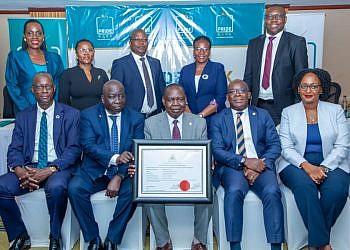While presiding over the launch of the Financial Sector Anti-Fraud Consortium (AFC), Director of Public Prosecutions Jane Frances Abodo urged regulators, financial institutions, telecoms, and law enforcement to unite in the fight against the growing threat of financial fraud.
Describing fraud as a “sophisticated criminal enterprise that knows no borders,” Abodo emphasized that the digital era has made it easier for fraudsters to exploit institutional weaknesses, often working “more coordinated than those trying to fight them.”
“We must not view trust as a virtue; it must be a guarantee we give to the people who depend on our systems,” she said, stressing that restoring and safeguarding public confidence is now a national imperative.
In her impassioned remarks, Abodo condemned the disjointed efforts of institutions battling financial crime, noting, “Working in silos doesn’t work anymore. Criminals don’t even know each other, but they’re coordinated. Meanwhile, we, who are fighting them, are fragmented.”
With Uganda losing between shs 2.4 billion and shs 24.9 billion annually to bank fraud alone, the DPP reminded stakeholders that behind every statistic are “real people—market vendors, students, entrepreneurs—whose lives are being disrupted.”
Calling the AFC a “paradigm shift from isolated efforts to a collaborative and strategic alliance,” she underscored the need for swift information-sharing, capacity building, and prosecutorial support.
“No single institution can combat fraud alone,” she said. “Banks may have the data, but lack investigative powers. Law enforcement can investigate, but often lacks timely access to information.”
She encouraged banks to invest in training prosecutors and investigators.
“For your own safety, train us—yes, even at your cost,” Abodo said, reinforcing that the responsibility is shared. “If you want 20 prosecutors, I’ll send them. If you want all of them, I will send all of them. Just give us the information.”
Concluding with a commitment from her office, Abodo said the Office of the DPP will prioritize financial fraud cases. “Let’s fast-track these cases. Let’s recover the money. Let’s restore public confidence. Because when we act together, we not only protect our financial sector we protect our country’s future.”
Chelimo Beata, Deputy Director at the CID, noted that cybercrime was initially underestimated, with only a limited number of officers currently equipped to handle financial fraud.
She emphasized that fraudsters are highly educated, well-resourced, and deeply connected, and called on financial institutions to support the training and capacity-building of law enforcement officers.
However, Chelimo expressed concern over the lack of cooperation from banks that fall victim to fraud, noting that their reluctance to share information with the police hampers investigations. She urged financial institutions to comply and provide timely access to information to enable swift and effective action against fraud.
Dr. Tumubweinee Twinemanzi, the Chairperson of the Financial Sector Anti-Fraud Consortium, echoed the urgency of collective action.
“We realized that the majority of the fraud taking place within the financial sector had a very unique aspect to it, the sense that the way the fraud was done in one institution is the same way it was being done in another one. So the question then became, why is it that no institutions are talking to each other?” he posed.
Dr. Twinemanzi noted that the fraud landscape is evolving adding that it undermines public trust, and emphasized that unity among financial institutions is the only viable path to overcoming the threat.
“Fraud isn’t just about misappropriated funds it erodes trust, the core of financial services. Every provider is essentially selling one thing, trust. Undermining it shakes the entire foundation of the sector,” he noted.
Ronald Azirwe, the Managing Director of Pegasus Technologies, pointed out that disunity provides fertile ground for fraudsters to operate.
“Fraudsters thrive in fragmentation,” he said, calling for a united front. “We are only as strong as our weakest link and can only succeed if we stand together. This launch represents a united front and the long-overdue acknowledgment of a shared challenge,” be remarked.
The newly launched Anti-Fraud Consortium (AFC) is a strategic alliance established to promote collaboration, coordination, and consistency in preventing and responding to financial fraud.
The urgency of such a united effort is highlighted by the Uganda Police Force’s Annual Crime Report, which revealed that the country lost shs72.1 billion to cybercrime alone.






































